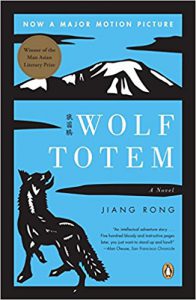Wolf Totem, by Jiang Rong, translated by Howard Goldblatt
Wolf Totem
By Jiang Rong, Translated by Howard Goldblatt
The Penguin Press
Four stars
Reviewed by Jessica Gribble
In November of 2007, Wolf Totem, by Jiang Rong, won the inaugural Man Asian Literary Prize. The prize is intended to bring exciting new Asian authors to the attention of the world literary community—in this case, welcoming English speakers to an experience that the Chinese have already overwhelmingly embraced. This quasi-autobiographical novel became an overnight sensation in China, selling millions of copies. Now English speakers can share in the smart, moving, sometimes joyful, and sometimes heartbreaking story of Chen Zhen, a Beijing intellectual who moves to the grasslands of Inner Mongolia during the Chinese Cultural Revolution.
Wolf Totem begins when Chen Zhen and several other students have been living with the nomadic Mongols in yurts on the grassland for two years. The first scene shows Chen Zhen and old man Bilgee, the wise leader of the group, peering through telescopes at a pack of Mongolian wolves, the totem of the Mongols. Already, in the first paragraph, a dichotomy is set up that will carry throughout the book: China versus Mongolia, development versus conservation, new versus old. At first we believe that Chen Zhen and the other Chinese students are in opposition with Bilgee, the wolves, and the earth. However, the students care a lot about the Mongol way of life and, while they sometimes transgress custom in their desire to learn for themselves, by the end of the book we see that they are joined with their Mongolian hosts in an age-old triangle that balances humans, wolves, and the earth.
Both much and little happen in Wolf Totem. It’s a dense book, full of Chen Zhen’s ideas about Chinese history and culture, especially his ideas about how different groups of people conquer each other in different ways and at different times. He and the other students work as shepherds and horsemen, taking part in the nomadic Mongols’ struggle for survival in a harsh land. The Mongols revere the wolf and have learned how to survive by copying wolves’ behavior. Chen Zhen becomes obsessed with learning as much as he can from and about the wolves, which leads him to kidnap a wolf cub, against the wishes of the community, and keep it as a pet. Despite their reverence for wolves, the Mongols are in a constant battle for survival and occasionally must trap and kill wolves, releasing them to Tengger—the name for the earth, for nature, for that which rules and rewards both humans and wolves. In turn, when people die, they are left to be eaten by wolves, completing the cycle.
This nuanced book taught me a lot about how nature and humanity can simultaneously work in tandem and be at odds. The wolves are totem, teacher, and foe. They are hunter and prey. At the end of the book, Chinese people bent on modern development overwork the delicate grasslands and turn them to desert. Chen Zhen returns to Mongolia in middle age to see that the lifestyle he has come to respect and cherish is almost gone.
Despite Howard Goldblatt’s beautiful translation, I often felt that Wolf Totem was too foreign for me to love. The characters think, behave, and speak in truly Asian ways. Their relationship with animals, in particular, felt strange and uncomfortable. This is a book in which nature and animals know more than humans, which put me a bit off balance. I sometimes felt like I was slogging through. But when I closed the book, I realized that the stark lives, grandiose wild scenes, foreign thoughts, majestic wolves, and lessons about the complexity and balance of our environment will stay with me.
